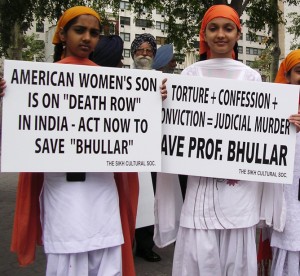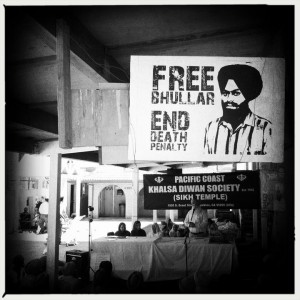Articles/Opinion
Protesters demand that India stop an execution over a coerced confession
July 29, 2011 | By Editor
By Marcia Yerman
On the afternoon of Monday, July 25, approximately 800 protesters from Sikh organizations and human rights groups opposed to the death penalty and torture gathered opposite the United Nations to show solidarity with Sikh Professor Devenderpal S. Bhullar, whose execution by hanging is pending in India.
Bhullar’s arrest stemmed from the ongoing ethnic conflict in Punjab, where he is part of the majority Sikh population. Although there was an armed movement for an independent Sikh state, Bhullar had no proven ties to any militant groups. He was nonetheless accused of bombing the All-India Youth Congress office in New Delhi — apparently because of his vocal opinions against the repression of his fellow Sikhs. After his arrest, Bhullar was reportedly tortured and forced to sign blank sheets of paper, which then became the basis of his “confession.”
 He was tried and convicted under the Terrorist and Disruptive Activities (Prevention) Act (TADA), which was actively used from 1984-1996 to fight “terrorist” activities. After complaints from human rights organizations that it was being utilized to facilitate torture, the Indian government phased it out in 1995. In its time, TADA garnered criticism similar to that heard now about the U.S. Patriot Act and the treatment of prisoners at Guantanamo Bay and elsewhere.
He was tried and convicted under the Terrorist and Disruptive Activities (Prevention) Act (TADA), which was actively used from 1984-1996 to fight “terrorist” activities. After complaints from human rights organizations that it was being utilized to facilitate torture, the Indian government phased it out in 1995. In its time, TADA garnered criticism similar to that heard now about the U.S. Patriot Act and the treatment of prisoners at Guantanamo Bay and elsewhere.
The rally took place after U.N. Secretary General Ban Ki-Moon was presented with a letter demanding intervention on Bhullar’s behalf. The gathering featured speakers including Bhullar’s brother, Tejinderpal Singh Bhullar (an American citizen), former death row inmate Lawrence Hayes, Jeffrey Deskovic (the victim of a wrongful conviction who served 16 years in prison) and Charles Bell, a peace and justice activist.
Many of those who addressed the crowd spoke in the Punjabi language, aimed at garnering the attention of local ethnic and international media. But when Hayes and Deskovic delivered their comments in English, they drew distinct parallels between Bhullar’s situation and what happened to them.
 On the afternoon of Monday, July 25, approximately 800 protesters from Sikh organizations and human rights groups opposed to the death penalty and torture gathered opposite the United Nations to show solidarity with Sikh Professor Devenderpal S. Bhullar, whose execution by hanging is pending in India.
On the afternoon of Monday, July 25, approximately 800 protesters from Sikh organizations and human rights groups opposed to the death penalty and torture gathered opposite the United Nations to show solidarity with Sikh Professor Devenderpal S. Bhullar, whose execution by hanging is pending in India.
Deskovic told the crowd, “I spent sixteen years in prison, here in the United States. It was a wrongful conviction based on a coerced confession.” He acknowledged his affinity to Bhullar’s case and commented, “The U.N. should know that the world is watching. Will they take a moral stand, or look the other way?”
Hayes, who was a member of the Black Panther Party, pointed to the cases of Mumia Abu-Jamal and Troy Davis as examples of “injustice here in America.” He stated that India was using its legal and judicial system as a way to legitimize eliminating opposition, while using the “terrorist” label to ignore and compromise the rights of “anyone who poses a threat to the system.” He advocated, “We need to join together.”
The Innocence Project, the New York based national litigation and public policy organization which successfully exonerated Deskovic, lists false confessions and government misconduct as two causes of wrongful conviction. Tejinderpal Singh Bhullar’s emphasized, “The judiciary put my brother on death row.” While the presiding judge in the case had acquitted his brother of all charges and had wanted to release him, T.S. Bhullar contends that the two dissenting magistrates had political affiliations that were consistent with anti-Sikh views.
For attorney Gurpatwant S. Pannun, legal adviser to Sikhs for Justice, the facts are simple. He maintained, “India practices torture on detainees. Bhullar’s case proves that when it comes to rights of religious minorities — be they Sikhs, Muslims or Christians — India’s democracy, rule of law and judiciary all collaborate to suppress the minorities.”
Bandana Kaur, a Master’s student at Yale who attended the protest, asserted that “Sikhs feel they have been denied cultural and economic rights by the central government.” She explained that the death penalty is applied almost exclusively to minorities and political dissenters, while violence against majority ethnic and religious groups is pushed under the rug — with any attempts to address these concerns being met with resistance in the name of national unity. She observed, “What we’re really talking about here is the use of the death penalty in huge nations like India and America, and how it is misused.”
Source: The Raw Story (rawstory.com)
To Get Sikh Siyasat News Alerts via WhatsApp:
(1) Save Our WhatsApp Number 0091-855-606-7689 to your phone contacts; and
(2) Send us Your Name via WhatsApp. Click Here to Send WhatsApp Message Now.
Sikh Siyasat is on Telegram Now. Subscribe to our Telegram Channel
Related Topics: Prof. Devender Pal Singh Bhullar




